Posted November 11, 2017 by Nicky in Reviews / 2 Comments
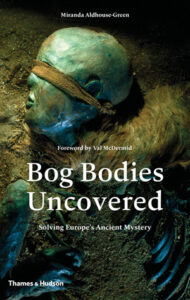 Bog Bodies Uncovered, Miranda Aldhouse-Green
Bog Bodies Uncovered, Miranda Aldhouse-Green
I’m not sure about the subtitle of “solving Europe’s ancient mystery”. It is a mystery, of course, and it’s comparatively ancient, but I don’t think Aldhouse-Green manages to solve it. Examine it closely and lay out what evidence we have, yes, but that evidence doesn’t convince me that we have enough to make real judgements about what was going on. Especially not because Aldhouse-Green’s book takes in bog bodies all over Europe — places that in many other ways haven’t been demonstrated to have similar beliefs.
The book is strongest when she sticks to the facts. If you’re fascinated by bog bodies, there’s a whole range of them discussed at length, both the forensics of their deaths and the items that were found with them, and even what we know now with modern science about their lives. Even if you’re with me in thinking that some of the theories lean too hard on supposing there are commonalities across huge breadths of space and time, there’s a lot to learn here.
Rating: 4/5
Tags: book reviews, books, history, non-fiction
Posted November 8, 2017 by Nicky in Reviews / 0 Comments
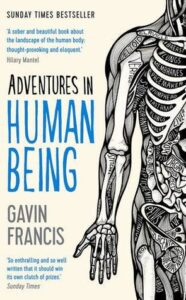 Adventures in Human Being, Gavin Francis
Adventures in Human Being, Gavin Francis
Gavin Francis’ book is basically a series of essays about the human body and how it works (and how it breaks), from the head down. It’s pretty readable, with anecdotes from Francis’ time as a doctor, though it’s not something that grabbed me as much as, say, Henry Marsh’s Do No Harm. Actually, it’s fading a bit from memory already. It’s certainly readable and filled some time during an epic plane and train ride from Canada through Amsterdam to Belgium; it’s not revelatory, or amazingly written. I’m a little surprised, though, at how ‘meh’ I feel about it in retrospect.
Rating: 3/5
Tags: book reviews, books, non-fiction, science
Posted November 7, 2017 by Nicky in Reviews / 4 Comments
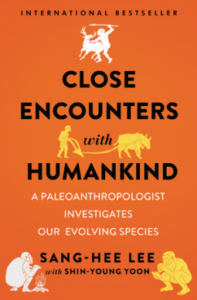 Close Encounters with Humankind, Sang-Hee Lee
Close Encounters with Humankind, Sang-Hee Lee
Received to review via Netgalley; publication date 20th February 2018
Close Encounters with Humankind is a sort of compendium of various questions about hominid ancestors. It doesn’t try to tackle things chronologically or systematically. Instead, it poses interesting questions — are there cannibals in the line of human descent? How much of a Neanderthal am I? — and then tries to answer them with the best of what we know at the moment. Sometimes the answers aren’t entirely satisfactory or complete, because the evidence isn’t there (yet, or perhaps ever; behaviour, after all, does not fossilise).
It’s a pretty good tour through some interesting topics, although if you’re already interested in this sort of thing, you may well find that there’s nothing much new here for you. But if that knowledge is a bit cursory or out of date, this’d probably be perfect.
Rating: 3/5
Tags: book reviews, books, non-fiction
Posted November 6, 2017 by Nicky in Reviews / 6 Comments
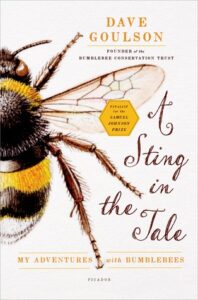 A Sting in the Tale, Dave Goulson
A Sting in the Tale, Dave Goulson
I’m not a big fan of insects. If you know me personally, even a little, you’re probably laughing at the understatement there. So okay, the truth is that insects scare me silly. But so did disease at one point, and now look at me tearing through my degree and thinking of working in a lab to study infectious diseases… All through the power of reading enough about it to really pique my curiosity. So maybe I can do the same with insects, and hence this book. Not that bumblebees frighten me that dreadfully; they’re sort of endearing, at their best. But it’s a place to start, and Goulson’s enthusiasm really sold me on it. I even have another book potentially lined up about bees now…
There’s a lot of personal reflection, including talking about what he did as a kid to get involved with bees, and his place in France where he’s rewilding a field to attract more wildlife. It’s not strictly scientific, by-the-book facts, that’s for sure; for me, that added to the appeal. I could almost get excited about bees, through the eyes of Dave Goulson — and I could definitely get excited about his conservation goals and hopes.
Also, you get to learn fun things like the fact that bees have smelly feet…
Recommended! Even if bees are not exactly your cup of honey-sweetened tea. (And yes, yes, I know, bumblebees do not actually make honey. I did pay attention to that much, I promise.)
Rating: 4/5
Tags: book reviews, books, non-fiction, science
Posted November 4, 2017 by Nicky in Reviews / 4 Comments
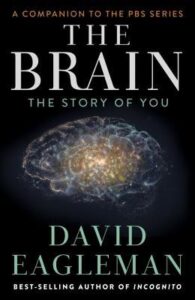 The Brain, David Eagleman
The Brain, David Eagleman
If you haven’t read anything else about the human brain and how it works, you’ll probably find this interesting. It covers the usual points: a lot of interesting stuff about the way our brains work and the way they perceive the world. And it’s definitely presented in a readable, easy to understand fashion; I think it’d definitely be suitable for a layperson.
For me, however, it got boring pretty fast because I know this stuff. It’s hardly even revision for me – this is stuff I just know. I had the same feeling with one of the author’s previous books, so I’d better keep a mental note and avoid in future!
Rating: 2/5
Tags: book reviews, books, non-fiction, science
Posted November 2, 2017 by Nicky in Reviews / 2 Comments
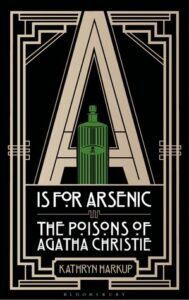 A is for Arsenic: The Poisons of Agatha Christie, Kathryn Harkup
A is for Arsenic: The Poisons of Agatha Christie, Kathryn Harkup
I avoided picking this up for quite a while, mostly because I’m just not that interested in Agatha Christie’s work — she wrote some great mysteries, but I’m more interested in characters, and I’m not overly fond of any of hers. (Poirot and his mannerisms drive me mad, sorry.) It turns out that while this does talk a lot about Christie’s work, it also relates her ideas to actual chemistry — of which she’d have been aware of as an assistant in a dispensing chemist — and actual murders that she may have found inspiration from.
All in all, it becomes a rather entertaining little package, not just focused on recounting the plots of Agatha Christie’s books. The chemistry involved was pretty easy for me to follow, but bear in mind that I am in my last year of a science degree! It might get a little too involved for people who are interested in this from the Agatha Christie end of the equation (while not, I think, being worth reading just for the explanations of how poisons work, because there’s a lot of social info and stuff about Christie and her plots as well). Fortunately, if you are a fan of Christie, Harkup doesn’t spoil any of her plots — or in the rare cases she has to for the sake of explaining things properly, she warns you in advance.
I still would’ve liked to see it be about the Golden Age crime fiction in general, and then Harkup would’ve had a great one to analyse in the shape of Sayers’ Strong Poison… but that’s beside the point.
Rating: 4/5
Tags: book reviews, books, crime, non-fiction
Posted November 1, 2017 by Nicky in Reviews / 0 Comments
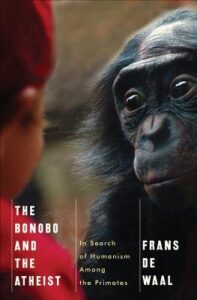 The Bonobo and the Atheist, Frans de Waal
The Bonobo and the Atheist, Frans de Waal
If you’ve ever wondered about the evolution of morality and whether humans are the only moral creatures, this is a good exploration of the idea. Frans de Waal posits that we have an innate sense of morality, and like Jonathan Haidt, suggests that this sense dictates what we do – the emotional tail wags the rational dog, rather than the other way round, in Haidt’s terminology.
The main attraction for me is not the ideas, which I’ve come across plenty of times before, but the anecdotes about the behaviour of wild and captive bonobos and chimpanzees. They’re our closest relatives, on the evolutionary tree, and we can learn a lot about ourselves from observing them. Frans de Waal includes a lot of interesting titbits, and I found his work fascinating, though not surprising.
It probably won’t convince anyone who thinks that morality comes only as handed down from God, but if you wonder about this kind of thing, you’ll probably find this interesting.
Rating: 4/5
Tags: book reviews, books, non-fiction, science
Posted October 30, 2017 by Nicky in Reviews / 0 Comments
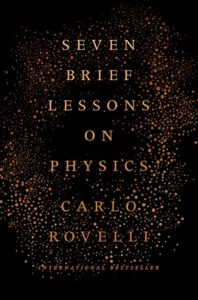 Seven Brief Lessons on Physics, Carlo Rovelli
Seven Brief Lessons on Physics, Carlo Rovelli
Carlo Rovelli writes simply and clearly about some huge ideas, including quantum and relativity. Each chapter is a mere glimpse at the idea – a way of seeing things that may or may not work for the individual reader, but nonetheless offers a perspective, a window from afar.
The writing is, even in translation as I read it, elegant and well put. I don’t feel like I have improved on my understanding of any of these concepts by reading this book, but then, I already had a basic grasp. It might even be easier to appreciate Rovelli’s work sans prior knowledge.
Rating: 3/5
Tags: book reviews, books, non-fiction, science
Posted October 26, 2017 by Nicky in Reviews / 2 Comments
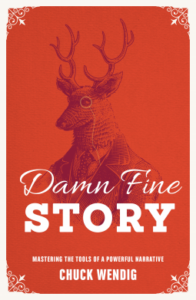 Damn Fine Story, Chuck Wendig
Damn Fine Story, Chuck Wendig
Received to review via Netgalley; publication date 18th October 2017
If you want writing advice, this isn’t a bad place to stop. If you want advice on how to put a story together, this is a great place to stop. It has all sorts of anecdotes and examples about how good stories are put together, and sometimes about how well-known stories fail (think The Phantom Menace et al). It works just the same whether you’re talking writing a book, a screenplay, or sometimes even a good joke. Oral storytellers would benefit too — Wendig gives examples from his father’s oral stories too.
If you’re easily offended, though, maybe you want to avoid it. Wendig swears freely and relates stories his kid thinks are awesome, often scatalogical. He’s irreverent and sometimes he spoilers stories like Star Wars, or doesn’t but doesn’t in a way that takes aim at them, and… Yeah, just, if you have any sacred cows, you might want to avoid.
My main criticism is that sometimes the jokey asides just felt like filler. I enjoy Chuck Wendig’s humour and randomness at times on Twitter… it felt out of place in the middle of a chatty seminar on storytelling. Time and place, dude. Time and place.
Rating: 3/5
Tags: book reviews, books, non-fiction
Posted October 25, 2017 by Nicky in Reviews / 0 Comments
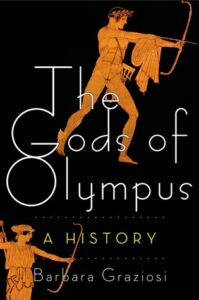 The Gods of Olympus, Barbara Graziosi
The Gods of Olympus, Barbara Graziosi
For me, there weren’t many surprises here in Barbara Graziosi’s analysis of the Greek pantheon and their afterlife. I already knew how they translated into the Roman world (thank you, Mrs Wilson, for many fascinating lessons in classics!) and I had some idea of how they translated into the medieval and Renaissance world as well (I believe thanks there must go to Richard Wilson, Martin Coyle and Rob Gossedge – I can’t untangle in my mind quite who was responsible for this, but I blame my degree all the same).
Nonetheless, it’s a good survey of the Greek pantheon and the enormous influence they had on religious thought and, in the end, literature. I could wish for a bit on modern paganism, since I have friends who have revived the worship of the Olympians, but that’s probably a little much to ask.
It’s an enjoyable read, though not a particularly enlightening one, for me.
Rating: 3/5
Tags: book reviews, books, non-fiction
 Bog Bodies Uncovered, Miranda Aldhouse-Green
Bog Bodies Uncovered, Miranda Aldhouse-Green








